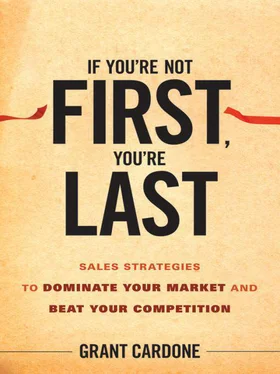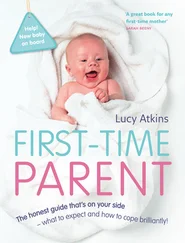Grant Cardone - If You're Not First, You're Last - Sales Strategies to Dominate Your Market and Beat Your Competition
Здесь есть возможность читать онлайн «Grant Cardone - If You're Not First, You're Last - Sales Strategies to Dominate Your Market and Beat Your Competition» — ознакомительный отрывок электронной книги совершенно бесплатно, а после прочтения отрывка купить полную версию. В некоторых случаях можно слушать аудио, скачать через торрент в формате fb2 и присутствует краткое содержание. Год выпуска: 2010, ISBN: 2010, Издательство: Wiley, Жанр: small_business, на английском языке. Описание произведения, (предисловие) а так же отзывы посетителей доступны на портале библиотеки ЛибКат.
- Название:If You're Not First, You're Last: Sales Strategies to Dominate Your Market and Beat Your Competition
- Автор:
- Издательство:Wiley
- Жанр:
- Год:2010
- ISBN:9780470645918
- Рейтинг книги:3 / 5. Голосов: 1
-
Избранное:Добавить в избранное
- Отзывы:
-
Ваша оценка:
- 60
- 1
- 2
- 3
- 4
- 5
If You're Not First, You're Last: Sales Strategies to Dominate Your Market and Beat Your Competition: краткое содержание, описание и аннотация
Предлагаем к чтению аннотацию, описание, краткое содержание или предисловие (зависит от того, что написал сам автор книги «If You're Not First, You're Last: Sales Strategies to Dominate Your Market and Beat Your Competition»). Если вы не нашли необходимую информацию о книге — напишите в комментариях, мы постараемся отыскать её.
If You're Not First, You're Last: Sales Strategies to Dominate Your Market and Beat Your Competition — читать онлайн ознакомительный отрывок
Ниже представлен текст книги, разбитый по страницам. Система сохранения места последней прочитанной страницы, позволяет с удобством читать онлайн бесплатно книгу «If You're Not First, You're Last: Sales Strategies to Dominate Your Market and Beat Your Competition», без необходимости каждый раз заново искать на чём Вы остановились. Поставьте закладку, и сможете в любой момент перейти на страницу, на которой закончили чтение.
Интервал:
Закладка:
If the person has not bought from you, conduct new fact-finding as though you haven’t before. You will need to start this sale over from scratch. Do not assume that what the client previously wanted is consistent with what he or she needs or wants now. Ask the person what has changed since then. Inquire as to why he or she opted not to do anything at that time. Then ask, “What are you looking to accomplish now?” This sales cycle may come back to life and require you to start new fact-finding, launch a new presentation, possibly introduce a completely different product, and present a brand new proposal. Do not shortcut any of your sales steps because you did them earlier . Start this entire sale over and disregard anything that you’ve done before; it is no longer pertinent.
If the contact bought from someone else, congratulate him or her. Ask how the product is working, and let the contact know that you’re there to help if there is anything you can do to serve him or her. Say something along the lines of, “I would be happy to help you regardless of where you bought. I regret that I was unsuccessful in earning your business.” Remember: Every contact is more valuable than just the one sale. This person will buy again and likely knows others who will buy. Again, the only difference between a contact and a contract is the relationship. The competitor who was lucky enough to get this person’s business is probably no longer following up with him or her, which puts you head and shoulders above the person who won the previous sale.
Remember to follow up every call with a letter, and put this individual on your list of personal contacts and your intended visits on your calendar. Continue to nurture these “lost” opportunities until they join the ranks of your client list. Don’t forget that these people are part of your power base, even though you have not sold to them (yet). I once had a prospect in Washington, D.C., whom I called twice a year. I failed one year after another to earn his business. But I continued to treat him as a client and call him regularly, and after 10 years of persistence, I finally earned his business. It was one of the biggest contracts I ever landed. As Vince Lombardi accurately stated, “Winners never quit, and quitters never win!”
Converting unsold leads can be profitably used on prospects who have inquired about your product or service within the last year or two—sometimes even three years ago or longer. However, the best prospects would probably be those who contacted you within the past six months. I personally don’t set time limitations when reactivating. A contact from three years ago is no more or less valuable to me than one made three days ago. What is of value to me is the individual —the nature of the previous relationship; his or her name, phone number, and e-mail address; and where I can go to make personal contact. I find that as many as 50 percent of the prospects I contact will encourage me to send literature and show some level of interest in my products or services. Of those, maybe 20 percent will be buyers in the same period. Follow up, follow up, follow up. Persistence always pays off.
However, you must be creative in continuing to follow up in this manner. You cannot merely focus on selling your product. I have had people tell me, “Grant, you are wasting your time.” Yet I still continued with my commitment and followed up because I didn’t believe that I was wasting my time; I was investing it and doing the job necessary. Whether it meant making another call, sending a piece of mail or an e-mail, paying a personal visit, or figuring out where a client was going to be at a certain time so I could coordinate bumping into that person, I continued to follow up.
Make the decision that no one is going to sway you from doing your job and taking the actions necessary to create the business you want. I know it may seem a bit extreme, but you and I are not looking for approval. We want to grow our businesses. Americans have this incredible aversion to anger and treat it as unwanted. Other cultures put a lot less meaning on strong emotions and recognize them as just being part of the exchange that takes place. Sometimes people get heated; it doesn’t mean you shouldn’t continue the transaction and consummate a deal.
A successful Los Angeles businessman named Kevin Kaul told me, “The difference between a contact and a contract is the relationship, and if you don’t continue contact, you will never create the relationship necessary to turn the contact into a contract.” To really be in a relationship means that you are in it during good times and bad. After all, the fact that my wife and I have a disagreement doesn’t mean I wouldn’t ever talk to her again. Yet businesses, management, entrepreneurs, and salespeople make this mistake every day. They fail to follow up because of some perceived negative emotion, communication, or lack of interest on the part of the prospect. Some appear concerned that if they follow up too persistently, they may be labeled as desperate. However, becoming overly concerned about a label like this means that most people never do what is necessary to be labeled highly successful.
To help make sense of pushing through uncomfortable moments, try to determine what the benefit will be when the uncomfortable action pays off. Let’s say you want a client who is worth $100,000 to your company and $10,000 to you—in addition to job security and a sense of accomplishment. Ask yourself, “Is it worth going through the discomfort of continuing to follow up—even after I have been told no—in order to have any hope of getting this done?” If you don’t follow up, you will not get the sale. If you do, you might! A client once told me, “I never do business with anyone the first three times they call on me. Most I won’t even see. I figure if they don’t believe in their product or service enough to keep following up, why should I waste my time to see them the first time?”
I was once involved in a very large transaction in which all parties thought we had an agreement except for me. I simply was not satisfied with the price I was being paid even though everyone else, including my partners, were very happy. While I knew a renegotiation would be ugly and create a lot of negative emotions, I also knew that if I didn’t renegotiate, I was always going to regret it. I elected to renegotiate despite everyone’s advice, and while it did get very hairy and emotional, we did not lose the deal—and increased our sales price by almost $12 million. I know you’re sitting there saying to yourself, “Sure, I would do it for twelve big ones.” But you need to start building the muscle and discipline to follow up and do the uncomfortable things on a smaller scale because these difficult actions will prepare you for big transactions. Follow up, follow up, and follow up—despite what anyone tells you, despite the emotions, despite anything—follow up!
Another example of the importance of persistence: I recently had someone show an interest in my company’s services, but when we started to follow up with information and pricing, he seemed to lose interest. I started calling him back and spoke with him briefly on two occasions. Since then, neither my staff nor I have been successful getting him back on the phone. I’ve left 30 messages on his business and cell phones and have sent him at least 18 e-mails. All this was done over a period of six weeks, with each call and e-mail communicating a high degree of interest in him and his company and with me clearly stating, early on, that I would continue this type of activity no matter how long it took. We also sent him six videos and six sales strategies via e-mail that he could use for his business. Now, keep in mind that he responded to only 3 of the 52 transmissions sent to him, none of which took place after the first week. You might think by his lack of response that he was not interested. However, I did not believe that his interest was as important as my interest in him. Just as I was concluding this chapter, he e-mailed me asking for information on me and my company relative to providing him with support for the upcoming year.
Читать дальшеИнтервал:
Закладка:
Похожие книги на «If You're Not First, You're Last: Sales Strategies to Dominate Your Market and Beat Your Competition»
Представляем Вашему вниманию похожие книги на «If You're Not First, You're Last: Sales Strategies to Dominate Your Market and Beat Your Competition» списком для выбора. Мы отобрали схожую по названию и смыслу литературу в надежде предоставить читателям больше вариантов отыскать новые, интересные, ещё непрочитанные произведения.
Обсуждение, отзывы о книге «If You're Not First, You're Last: Sales Strategies to Dominate Your Market and Beat Your Competition» и просто собственные мнения читателей. Оставьте ваши комментарии, напишите, что Вы думаете о произведении, его смысле или главных героях. Укажите что конкретно понравилось, а что нет, и почему Вы так считаете.












